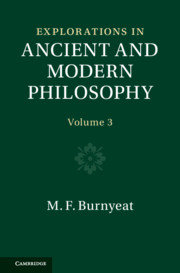Book contents
- Explorations in Ancient and Modern Philosophy
- Explorations in Ancient and Modern Philosophy
- Copyright page
- Contents
- Illustrations
- Preface
- Acknowledgements
- Abbreviations
- Introduction
- Part I The Republic
- Chapter 1 Plato on why mathematics is good for the soul
- Chapter 2 Long walk to wisdom
- Chapter 3 The truth of tripartition
- Chapter 4 Plato and the dairy-maids: the distribution of happiness inside and outside the ideal city of the Republic
- Chapter 5 Justice writ large and small in Republic IV
- Chapter 6 Fathers and sons in Plato’s Republic and Philebus
- Chapter 7 By the Dog
- Chapter 8 Culture and Society in Plato’s Republic
- The total culture: material, moral, musical
- First glance ahead: the divided soul in book X
- A tale of two cities
- Historical interlude: Greek couches
- Self-reflections in the cave
- Two types of imitator
- Second glance ahead: the form of couch in book X
- Modern analogies
- Plato’s programme
- Stage 1 of the reform: content
- Stage 2 of the reform: mimesis and the manner of performance
- Poetry and politics
- Stage 3 of the reform: musical technique
- Stage 4 of the reform: the material and social setting
- Retrospect on the reform in books II–III
- The reform resumed in book x: Homer as the first tragedian
- Does book X ban more mimesis than book III?
- Understanding mimesis
- Is book X’s concept of mimesis different from book III’s?
- The painted carpenter
- The poet’s knowledge
- The poet as maker
- The poet as painter
- The honeyed muse
- Back to the divided soul
- Chapter 8a Lecture I. Couches, song, and civic tradition
- Chapter 8b Lecture II. Art and the menace of mimesis
- Chapter 8c Lecture III. Farewell to Homer and the honeyed muse
- Part II The past in the present
- Appendix: The archaeology of feeling
- Bibliography
- Index locorum
Chapter 8c - Lecture III. Farewell to Homer and the honeyed muse
from Chapter 8 - Culture and Society in Plato’s Republic
Published online by Cambridge University Press: 24 March 2022
- Explorations in Ancient and Modern Philosophy
- Explorations in Ancient and Modern Philosophy
- Copyright page
- Contents
- Illustrations
- Preface
- Acknowledgements
- Abbreviations
- Introduction
- Part I The Republic
- Chapter 1 Plato on why mathematics is good for the soul
- Chapter 2 Long walk to wisdom
- Chapter 3 The truth of tripartition
- Chapter 4 Plato and the dairy-maids: the distribution of happiness inside and outside the ideal city of the Republic
- Chapter 5 Justice writ large and small in Republic IV
- Chapter 6 Fathers and sons in Plato’s Republic and Philebus
- Chapter 7 By the Dog
- Chapter 8 Culture and Society in Plato’s Republic
- The total culture: material, moral, musical
- First glance ahead: the divided soul in book X
- A tale of two cities
- Historical interlude: Greek couches
- Self-reflections in the cave
- Two types of imitator
- Second glance ahead: the form of couch in book X
- Modern analogies
- Plato’s programme
- Stage 1 of the reform: content
- Stage 2 of the reform: mimesis and the manner of performance
- Poetry and politics
- Stage 3 of the reform: musical technique
- Stage 4 of the reform: the material and social setting
- Retrospect on the reform in books II–III
- The reform resumed in book x: Homer as the first tragedian
- Does book X ban more mimesis than book III?
- Understanding mimesis
- Is book X’s concept of mimesis different from book III’s?
- The painted carpenter
- The poet’s knowledge
- The poet as maker
- The poet as painter
- The honeyed muse
- Back to the divided soul
- Chapter 8a Lecture I. Couches, song, and civic tradition
- Chapter 8b Lecture II. Art and the menace of mimesis
- Chapter 8c Lecture III. Farewell to Homer and the honeyed muse
- Part II The past in the present
- Appendix: The archaeology of feeling
- Bibliography
- Index locorum
Summary
Book X of the Republic does not ban more mimesis than Book III, nor operate with a different concept of mimesis, two claims often made. It surveys the same territory from a higher, more philosophical perspective, illuminating it particularly by reference to the theory of Forms and the psychology of soul parts that were introduced in sections of the Republic subsequent to Book III. Indeed, its arguments are directed to the philosopher, or someone sympathetic to Plato’s philosophy, not to any and every potential reader. Where they go beyond Book III in scope of what is banned is in pronouncing an anathema upon any poetry oriented towards pleasure rather than to what is beneficial, or upon what Socrates refers to as ‘the honeyed Muse’ – leaving only hymns to the gods and encomia of exemplary, heroic citizens. We endanger our souls and our grip on truth if, in watching tragic drama, we allow ourselves to enjoy grieving over suffering, and to some extent to believe, against our better judgment, that ups and downs of fortune are much more significant than they really are. Book X speaks to us from the viewpoint of eternity, from a position of deep spiritual elitism.
- Type
- Chapter
- Information
- Explorations in Ancient and Modern Philosophy , pp. 208 - 238Publisher: Cambridge University PressPrint publication year: 2022

